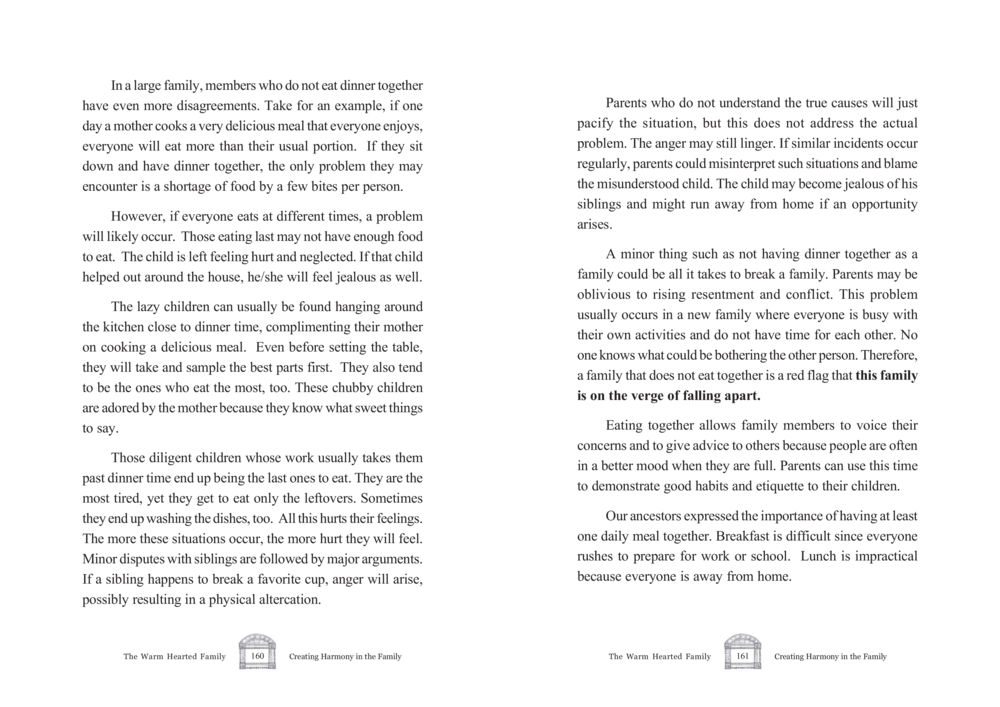The Importance of Family Dinners : หน้า 81/207
The Warm Hearted Family : หน้า 81/207 Discover how family dinners impact relationships, reduce conflicts, and foster communication among family members.
0 ครั้ง

สรุปเนื้อหา
In a large family, not eating dinner together leads to disagreements and emotional issues. Children who eat late may feel neglected, while those who help out end up with leftovers. This breeds jealousy and resentment. Minor disputes can escalate to major arguments if parents fail to see the underlying causes. Regularly missing family meals could signify deeper problems within the family dynamics. Shared meals promote communication, improve moods, and allow parents to teach good habits. Inspired by ancestral wisdom, it’s crucial for families to reconnect over at least one meal a day to maintain harmony and understanding.
หัวข้อประเด็น
-Family Dynamics
-Conflict Resolution
-Importance of Shared Meals
-Emotional Well-being
-Parental Guidance
ข้อความต้นฉบับในหน้า
In a large family, members who do not eat dinner together
have even more disagreements. Take for an example, if one
day a mother cooks a very delicious meal that everyone enjoys,
everyone will eat more than their usual portion. If they sit
down and have dinner together, the only problem they may
encounter is a shortage of food by a few bites per person.
However, if everyone eats at different times, a problem
will likely occur. Those eating last may not have enough food
to eat. The child is left feeling hurt and neglected. If that child
helped out around the house, he/she will feel jealous as well.
The lazy children can usually be found hanging around
the kitchen close to dinner time, complimenting their mother
on cooking a delicious meal. Even before setting the table,
they will take and sample the best parts first. They also tend
to be the ones who eat the most, too. These chubby children
are adored by the mother because they know what sweet things
to say.
Those diligent children whose work usually takes them
past dinner time end up being the last ones to eat. They are the
most tired, yet they get to eat only the leftovers. Sometimes
they end up washing the dishes, too. All this hurts their feelings.
The more these situations occur, the more hurt they will feel.
Minor disputes with siblings are followed by major arguments.
If a sibling happens to break a favorite cup, anger will arise,
possibly resulting in a physical altercation.
Parents who do not understand the true causes will just
pacify the situation, but this does not address the actual
problem. The anger may still linger. If similar incidents occur
regularly, parents could misinterpret such situations and blame
the misunderstood child. The child may become jealous of his
siblings and might run away from home if an opportunity
arises.
A minor thing such as not having dinner together as a
family could be all it takes to break a family. Parents may be
oblivious to rising resentment and conflict. This problem
usually occurs in a new family where everyone is busy with
their own activities and do not have time for each other. No
one knows what could be bothering the other person. Therefore,
a family that does not eat together is a red flag that this family
is on the verge of falling apart.
Eating together allows family members to voice their
concerns and to give advice to others because people are often
in a better mood when they are full. Parents can use this time
to demonstrate good habits and etiquette to their children.
Our ancestors expressed the importance of having at least
one daily meal together. Breakfast is difficult since everyone
rushes to prepare for work or school. Lunch is impractical
because everyone is away from home.
The Warm Hearted Family
160
Creating Harmony in the Family
The Warm Hearted Family
161
Creating Harmony in the Family
หน้าหนังสือทั้งหมด

1

2

3

4

5

6

7

8

9

10

11

12

13

14

15

16

17

18

19

20

21

22

23

24

25

26

27

28

29

30

31

32

33

34

35

36

37

38

39

40

41

42

43

44

45

46

47

48

49

50

51

52

53

54

55

56

57

58

59

60

61

62

63

64

65

66

67

68

69

70

71

72

73

74

75

76

77

78

79

80

81

82

83

84

85

86

87

88

89

90

91

92

93

94

95

96

97

98

99

100

101

102

103

104

105

106

107

108

109

110

111

112

113

114

115

116

117

118

119

120

121

122

123

124

125

126

127

128

129

130

131

132

133

134

135

136

137

138

139

140

141

142

143

144

145

146

147

148

149

150

151

152

153

154

155

156

157

158

159

160

161

162

163

164

165

166

167

168

169

170

171

172

173

174

175

176

177

178

179

180

181

182

183

184

185

186

187

188

189

190

191

192

193

194

195

196

197

198

199

200

201

202

203

204

205

206

207
หนังสือที่เกี่ยวข้อง
Load More
